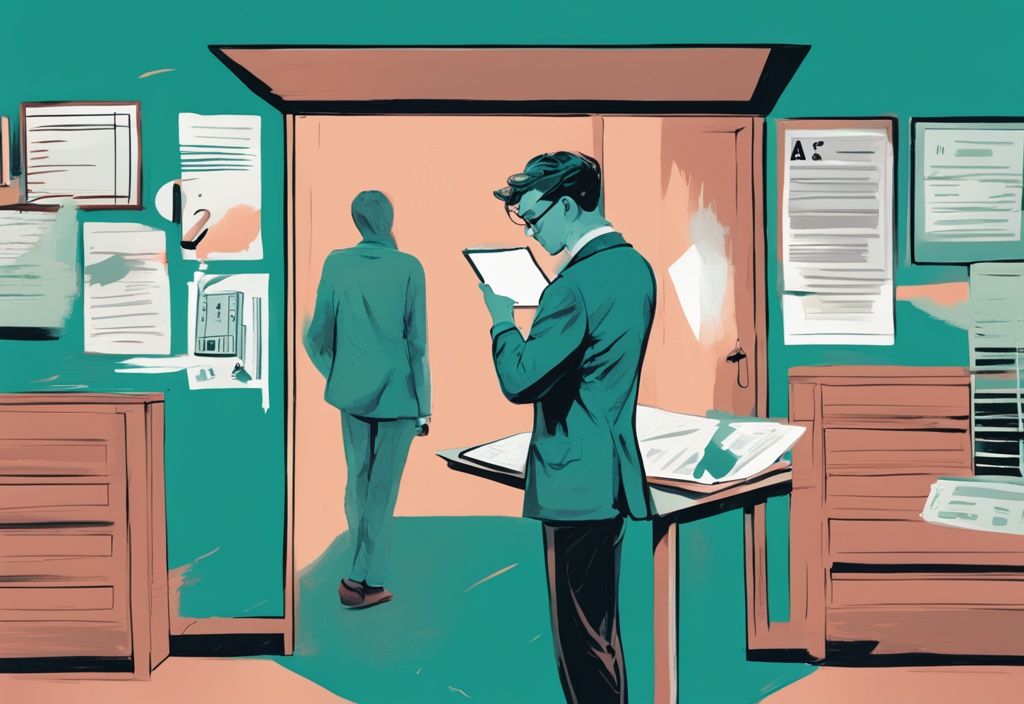Are you dreaming of a career in real estate but fretting over a past misdemeanor? Worry not, your dream is far from over! Even with a hiccup like a misdemeanor, you don’t have to see your hopes of becoming a certified real estate agent crumble. It’s a hurdle, yes, but definitely not a dead end!
In this article, I’ll walk you through how you can still get your real estate license despite the past misdemeanor. From understanding how misdemeanors impact your licensing application, state-specific rules, to taking essential steps for your application, it’s all covered here.
Stick around and let’s navigate this together. Just remember, everyone deserves a second chance, and in the real estate industry, transparency, proper documentation, and sound legal guidance can make that possible. So, let’s buckle up and step into our journey to become successful real estate agents.
Understanding Misdemeanors and Their Impact on Real Estate Licensing
When diving into the world of real estate, it’s essential to have a clear picture of how your past actions might influence your path. Here’s a breakdown of what misdemeanors are and why they’re significant in the context of becoming a licensed real estate agent.
What Constitutes a Misdemeanor
Misdemeanors are a category of criminal offenses that fall between felonies and infractions. While they are not as severe as felonies, they carry more weight than infractions like traffic violations.
Examples of misdemeanors include petty theft, simple assault, driving under the influence (DUI), and minor drug possession. It’s important to note that the definition and severity of misdemeanors can vary greatly from state to state, which can affect the impact they have on your real estate licensing application.
The Role of Criminal Background Checks for Future Real Estate Agents
If you’ve ever wondered, “Can you be a real estate agent with a misdemeanor?” it’s crucial to understand the role of criminal background checks in the licensing process.
Every state mandates these checks to determine whether an applicant poses any risk to clients and the public, making it crucial to understand the importance of conducting thorough real estate background checks to ensure trustworthiness in the industry. Performing real estate background checks can help ensure you build a competent, trustworthy team. These checks delve into your criminal history and help gauge your eligibility for a real estate license.
One key aspect to remember is that failing to disclose any criminal history, including misdemeanors, can lead to an automatic denial of your application. Transparency is absolutely essential in ensuring that the licensing board has all the information they need to make a well-informed decision.
How Misdemeanors Can Affect Your Real Estate Licensing Application
Overview of Licensing Limitations for Misdemeanor Offenders
Licensing limitations for individuals with misdemeanors hinge on several factors. The nature of the misdemeanor plays a critical role. Crimes involving dishonesty, fraud, theft, or violence are scrutinized more severely and are more likely to lead to a denial of a real estate license application.
The recency of the misdemeanor is another crucial consideration. More recent offenses are treated with heightened caution compared to those committed several years ago.
Efforts toward rehabilitation are equally significant. Showing sincere attempts at making amends and bettering behavior—like completing community service, undergoing counseling, or maintaining a clean record since the offense—can make a big difference.

Some states even have specific time frames after which misdemeanors are no longer considered relevant, providing a pathway for eventual eligibility.
Understanding State-by-State Differences in Licensing Rules
The rules governing whether you can be a real estate agent with a misdemeanor can differ significantly from state to state. Here are some notable examples:
- Alabama: Crimes involving moral turpitude, which include acts of deceit or dishonesty, may disqualify you from receiving a real estate license.
- California: Specific misdemeanors such as petty theft or drug possession for sale are grounds for disqualification. However, each application is reviewed individually, considering the circumstances and efforts towards rehabilitation.
- Colorado: Minor misdemeanors are evaluated on a case-by-case basis. The state looks into the nature of the offense, how long ago it occurred, and whether the applicant has demonstrated a pattern of good behavior since.
- Texas: Misdemeanors in Texas are assessed individually, with consideration given to the specifics of the case and the applicant’s subsequent actions. Honest disclosure and evidence of rehabilitation are crucial.
- Other States: Each state has its own set of rules and requirements, often with significant variations. Some may have more lenient policies allowing for older misdemeanors to be overlooked, while others maintain stringent standards irrespective of the time elapsed since the offense.
Understanding these differences is paramount for applicants with a misdemeanor history. Knowing the precise requirements and taking steps to meet them can make all the difference in the approval process.
Improving Your Chances of Approval Despite Having a Misdemeanor
Steps to Elevate Your Reputation: Demonstrating Honesty and Integrity
Being upfront and transparent about your misdemeanor history is crucial when applying for a real estate license. Disclosing your past shows sincerity and a willingness to acknowledge mistakes, which can positively influence the decision-making process of the licensing board.
Gaining endorsements or references from reputable individuals who can vouch for your character is a powerful way to bolster your application. These testimonies from employers, community leaders, or mentors can attest to your integrity and dedication to professional and personal growth.
Remember, demonstrating honesty isn’t just about revealing your misdemeanor; it’s about showing your commitment to ethical behavior moving forward. This dual approach can make a significant impact on how your application is perceived.
Documentation of Rehabilitation: A Gateway to Approval
Providing comprehensive documentation of your efforts towards rehabilitation is another vital step. This includes evidence of completed community service, participation in counseling or treatment programs, and any other activities that showcase your dedication to self-improvement.
A clean record over a significant period can serve as strong evidence of your rehabilitation and positively impact the assessment of your application. Alongside this, letters of recommendation or testimonials attesting to your good behavior can significantly enhance your application.
These documents collectively paint a picture of your journey towards rehabilitation and your readiness to adhere to the ethical standards expected of a real estate agent.

How Legal Guidance Can Help You Get Approved
Legal guidance is invaluable when navigating the complexities of the real estate licensing application process, especially with a misdemeanor on your record. Legal professionals can provide tailored advice on how to present your misdemeanor in the most favorable light, helping to frame your past actions within the context of your rehabilitation efforts.
Moreover, a lawyer can assist you through the procedural intricacies, such as hearings or appeals, ensuring that your case is represented accurately and compellingly. They can also aid in gathering and presenting rehabilitative evidence effectively, thereby enhancing the likelihood of a successful outcome.
Their expertise can be crucial in highlighting how you have transformed your life, reassuring the licensing board of your commitment to ethical and professional conduct.
The Real Estate Licensing Application Process
Understanding the Necessity of Disclosures and Background Checks
Fully disclosing all criminal convictions is a mandatory component of the real estate licensing application. When you ask, “Can you be a real estate agent with a misdemeanor?” it’s crucial to understand that transparency is vital. State real estate commissions conduct thorough background checks to verify the applicant’s history, assessing eligibility, and minimizing risk to clients and the public. Non-disclosure of any criminal history, including misdemeanors, can lead to immediate denial of the application. Therefore, honesty is paramount when navigating this process.
Anticipating Different Application Outcomes
When applying for a real estate license, you can anticipate a range of outcomes, including approval, denial, or a request for additional information. The question, “Can you be a real estate agent with a misdemeanor?” hinges significantly on these potential outcomes.
In some cases, you may be required to appear for a hearing to provide further details regarding your misdemeanor. Initial denials, while disappointing, are not the end of the road; they can often be appealed with additional supporting documentation that demonstrates rehabilitation and good character. Being prepared for these steps can make a significant difference in the licensing journey.
Decoding the Hearing and Appeals Process
Hearings are critical opportunities to explain the context of your misdemeanor and present evidence of rehabilitation. This step is crucial when considering, “Can you be a real estate agent with a misdemeanor?” During the appeals process, applicants have the chance to challenge initial denials.
Preparing comprehensive documentation, such as character references and evidence of completed rehabilitation programs, can significantly improve the likelihood of a successful appeal. Obtaining expert testimony can also be a powerful tool in convincing the licensing board of your capability to uphold the standards of the real estate profession.
Overcoming Challenges After Becoming a Real Estate Agent with a Misdemeanor
Winning Client and Employer Trust Despite Past Violations
Establishing trust as a real estate agent with a misdemeanor requires time and dedication. Think of it as planting a garden; you nurture it consistently, and eventually, you’ll see it flourish. Focus on delivering exceptional services and maintaining high standards of professionalism.
Transparency is crucial—openly discussing your misdemeanor with employers and clients can help manage expectations and address potential concerns. Building strong professional relationships is like laying a solid foundation. Actively seek client testimonials—these positive reviews serve as powerful endorsements that can gradually elevate your trustworthiness in the industry.
The Value of Honesty and Transparency in the Real Estate Industry
Honesty and transparency are indispensable qualities in the real estate industry, which relies heavily on trust. When addressing the question, “can you be a real estate agent with a misdemeanor,” it’s essential to disclose your past misdemeanor upfront. This act of integrity significantly enhances your credibility.
Consistent ethical behavior and upholding transparency in all dealings are fundamental to maintaining a good reputation long-term. Imagine your career as a house; a foundation based on honesty will make it strong and enduring. Demonstrating that you have learned from past mistakes and are committed to ethical practices can help establish a foundation of trust with clients and peers alike.

FAQ
Can You Be a Real Estate Agent with a Misdemeanor from Many Years Ago?
Typically, older misdemeanors are considered more leniently, especially if you’ve maintained a clean record since the incident. For example, states like Florida and Delaware often overlook misdemeanors if a significant amount of time has passed. Always ensure you check state-specific guidelines to confirm the requirements in your area.
Which Misdemeanors are Most Problematic for Gaining a Real Estate License?
Some misdemeanors pose greater challenges for obtaining a real estate license, particularly those involving fraud, theft, violence, or dishonesty. Key examples include credit card fraud, assault, and theft-related offenses. Such crimes can severely impact your trustworthiness and eligibility within the real estate field.
How Can I Improve My Application to Maximize Chances of Approval?
Honesty is crucial. Be transparent about your criminal history and provide comprehensive documentation of your rehabilitation efforts. This might include character references, certificates from rehabilitation programs, and any other supporting documents. Seeking legal advice can also help you navigate the application process and present your case in the most favorable light.
If I’m Denied in My Home State, Can I Apply for a Real Estate License Elsewhere?
Yes, you can apply in another state. However, keep in mind that each state has its own licensing rules and processes. It’s crucial to research the prospective state’s regulations thoroughly. You might find jurisdictions with more lenient misdemeanor policies that are more accommodating.
How Can Demonstrating Rehabilitation Enhance My Chance of Getting a Real Estate License?
Consistent good behavior, completion of rehabilitation programs, and fulfilling your sentence requirements can positively sway licensing decisions. Providing strong evidence of rehabilitation, such as letters of recommendation, immensely enhances your chances of overcoming past convictions.
Remember, your actions and efforts after the misdemeanor are just as important as the offense itself. Demonstrating a commitment to improvement and responsibility can make a significant difference in your application.
Conclusion
Although having a misdemeanor can complicate the process, it does not automatically disqualify you from becoming a real estate agent. The key to navigating this journey successfully lies in understanding state-specific regulations, demonstrating honesty, and showing genuine efforts toward rehabilitation.
Understanding the regulations in your state is critical. Each state has its own set of rules and guidelines regarding misdemeanors and real estate licensing. Some states may be stricter, particularly with misdemeanors involving moral turpitude, while others may evaluate your situation on a case-by-case basis. Being well-informed about these nuances can help you prepare a more robust application.
Honesty and integrity are paramount when applying for a real estate license with a misdemeanor on your record. Full disclosure of your criminal history is not just required but can also work in your favor if presented correctly. Demonstrating that you take responsibility for past actions and are committed to ethical behavior can positively influence the decision-makers.
Efforts towards rehabilitation play a significant role in your application and ongoing career. Documenting your rehabilitation efforts—whether through community service, counseling, treatment programs, or maintaining a clean record—is essential. Letters of recommendation and testimonials from reputable sources can further vouch for your character, painting a picture of a responsible and reformed individual.
Seeking legal advice can provide an added layer of support. A legal professional can guide you through the complexities of the application process, help gather and present critical rehabilitative evidence, and assist in appealing any initial denials if necessary.
In a profession as trust-dependent as real estate, transparency and professionalism go a long way. By openly acknowledging your past and demonstrating a commitment to ethical conduct, you can build trust with clients and employers. Understanding concepts such as what is ratification in real estate can further enhance your credibility in the industry. Over time, consistent, high-quality service and honesty can help you overcome any challenges associated with having a misdemeanor in your past.
In conclusion, while a misdemeanor presents additional hurdles, it doesn’t shut the door on your aspirations of becoming a real estate agent. With the right approach, understanding the specific regulations, demonstrating rehabilitation, and maintaining transparency, you can significantly enhance your chances of obtaining a license and succeeding in your real estate career.
Hi, I’m Alex Harper, a real estate expert with over ten years of experience in property management and legal advice. My passion is making the often complicated world of real estate understandable. I share practical tips and simple solutions to help you make better decisions – whether you’re buying a home, renting or just want to learn more about the industry. With my knowledge and experience, I want you to feel well-informed and confident in your real estate projects. Let’s tackle this together!




